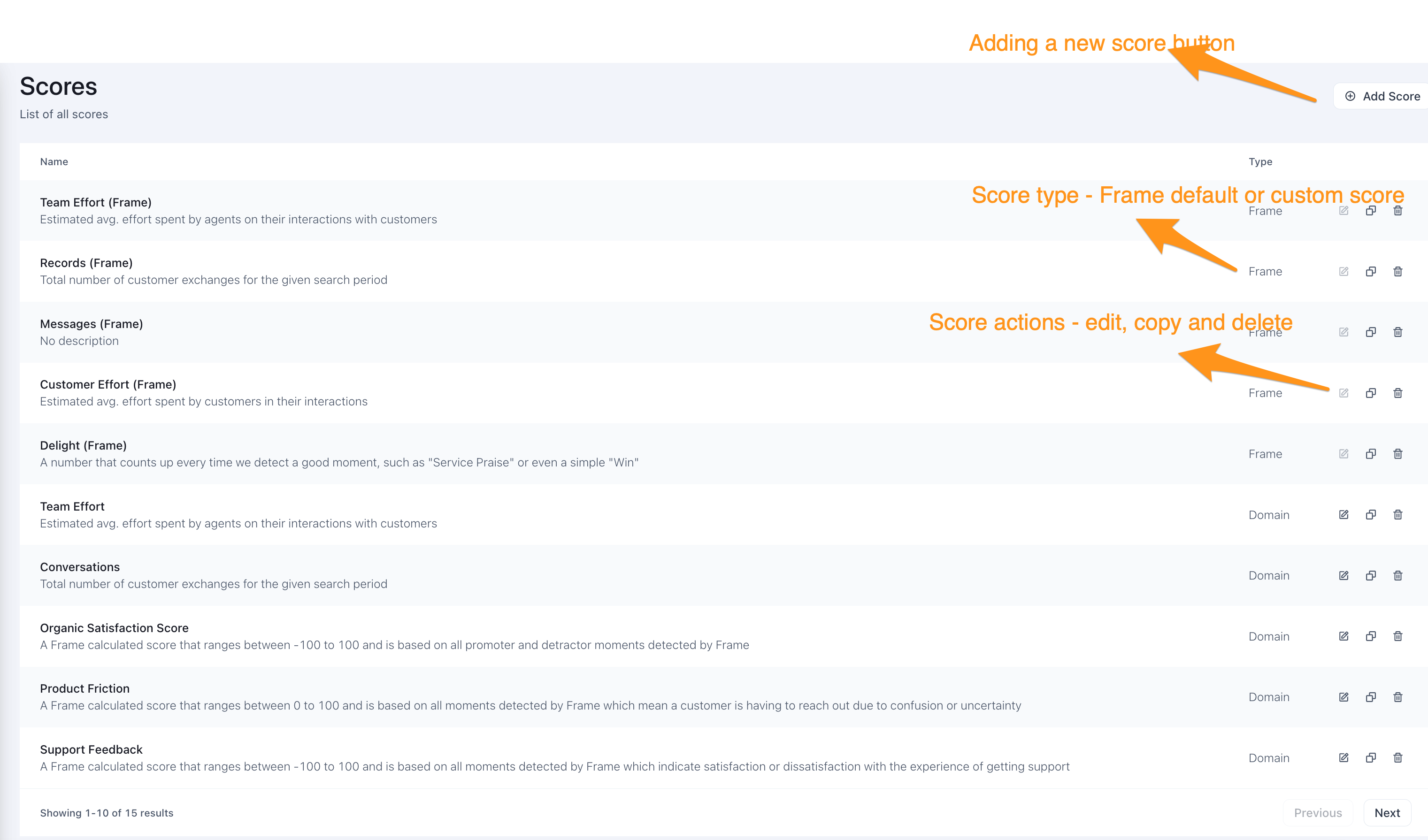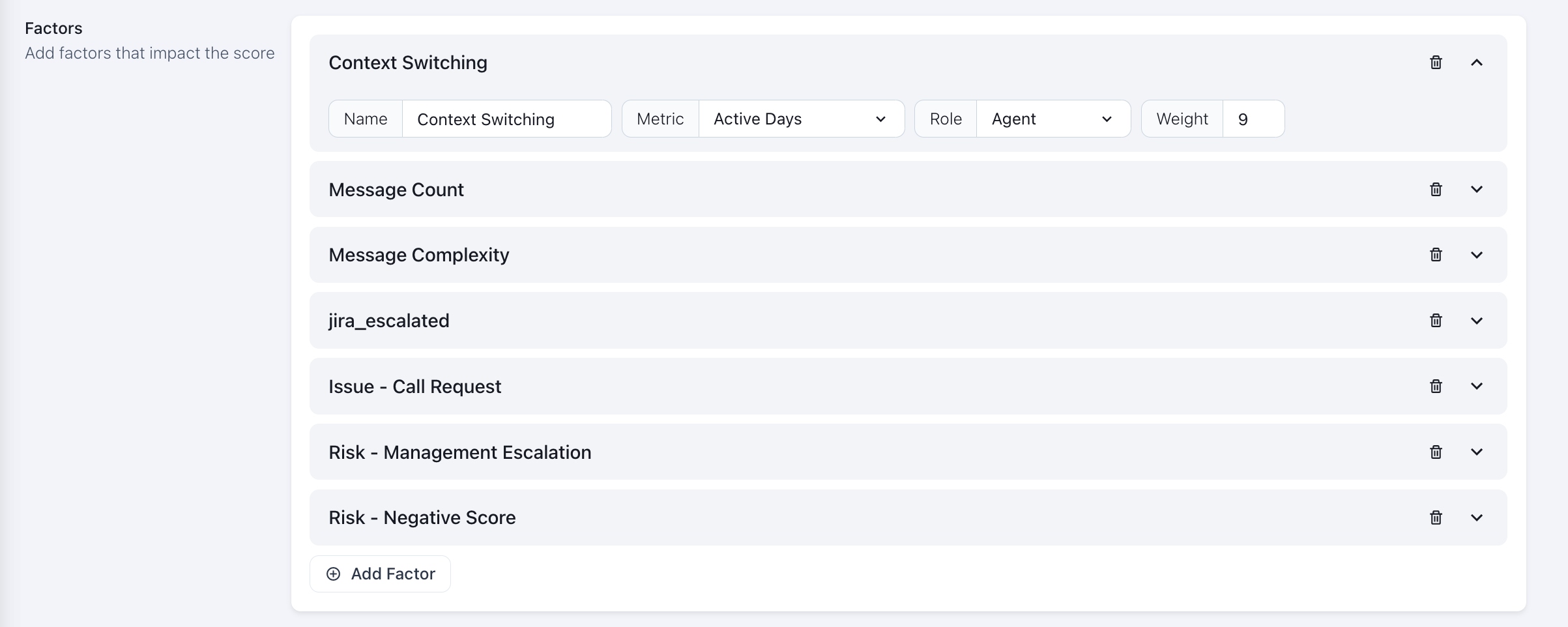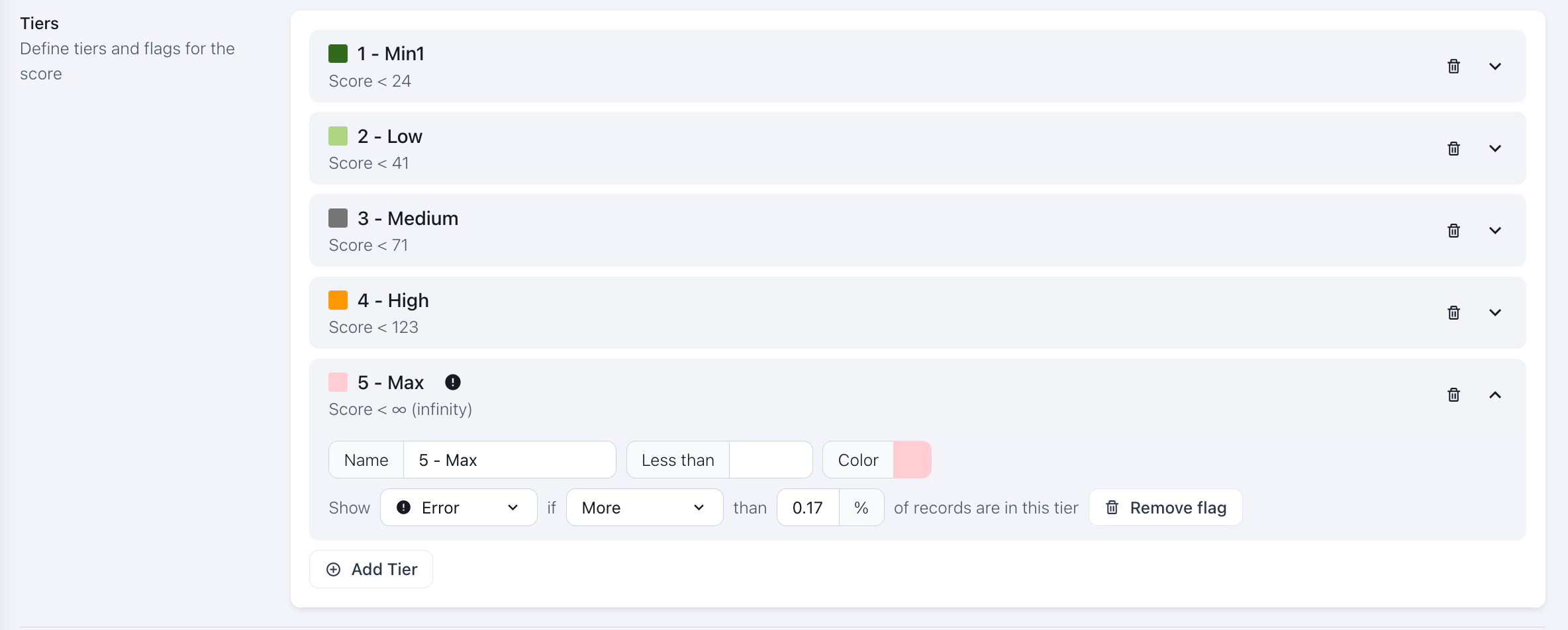Scores
All Scores
To configure a score, you can go to Configure --> Scores from the sidebar. You will see all the scores that are available in your domain.

In the scores table, you see
- List of all scores and their descriptions
- "Add Score" button that lets you create a new score
- "Type" column indicates whether a score is a frame-default or a custom score. Frame default scores cannot be edited but you can make a copy to customize them
- Score actions - Edit, Copy and Delete icons
Scores Dashboard Configuration
Configuration --> Scores lets you add scores to your domain. However these scores will not appear on the scores dashboard until you go to Configuration --> Scores Dashboard to add them to a list of scores that you wish to see on your scores dashboard.
Score Configuration
Click edit next to a score to view it's configuration. In the example below we are viewing a Team Effort score
General

- Score Name: Name of the score. This can be edited for custom scores
- Score ID: Define ID of the score. Once defined this can no longer be modified
- Description: Add/Edit a description for the score
Score Value

- Unit: You can choose between Minutes, Points, and None depending on the type of score being setup
- Transformation: Choose between Linear or Sigmoid. You will typically use a linear scale when the score is not bounded by a range and can go as high or low as it needs to. A sigmoid transformation is better utilized when your score needs to be bounded to a range.
- Initial value: You can select a starting value for each record. For example you can assume every conversation takes at least 2 minutes of team effort to get started on, and set the initial value as 2. For sigmoid function this value is set to 70 by default but can be changed
- Min and Max values: You can define upper and lower cut-offs for your score. For signmoid function these values are set to -100 and 100 by default but can be changed
- Target score direction: Select whether you wish the score to increase, decrease or are neutral about the direction
Cost Parameters

This section only appears when your unit selected = minutes and is optional. Entering cost parameter information lets you convert your team effort data to costs and unlock cost columns for this score. Your success team can help you calibrate these values
- Cost per minute ($): Est. cost per minute of your team
- FTE hours per month: # of hours each agent typically works per month on tickets
- Baseline minutes per ticket: avg time taken per ticket
Factors

This section lets you define which factors impact your scores and by how much. There are two types of factors you can add:
- Metric factor: This is a stored fact about a conversation. Examples include first response time, # of messages, # of sentences, # of days a ticket was active, etc.
- Signal factor: This includes signals that are detected on conversations by Frame. For example, Frame can detect moments of "Call Requests", "Management Escalation" etc, and add them to the conversation.
Fields for metric factors:
- Name: User defined
- Metric: Select from an option of 10 available metrics
- Role: Options include Record, Agent or Customer. This filters the factor to only include parts of the conversation where the agent is speaking (Role: Agent), or the customer is speaking (Role: Customer), or no filter (Role: Record)
- Weight: weight of the factor. A weight of 9 in the image above implies that for every day the ticket is active, add 9 minutes to the score
Metrics available:
- Active days
- Average wait
- Contact Days
- Contact Orgs
- Exchanges
- Contacts
- Messages
- Sentences
- First Response Time
- Observed Duration
Fields for signal factors:
- Name: user defined
- Signal: select the signal/tag to be used. The list includes all tags available in your domain
- Count by: record, message, or sentence. The signal may occur multiple times in a conversation. You can choose to count it everytime it appears in a sentence, or only once per message, or once per the entire record
- Role: only include the signal if its mentioned in a message from the agent (Role: Agent), customer (Role: Customer), or either (Role:l Record)
- Weight: define weight of the signal. ex. a weight for a management escalation could be set as 60 minutes
Tiers

Tiers are optional. They let you bucket your scores into categories based on score value ranges. Tier fields:
- name (required): user-chosen name of the tier
- color: color for a tier
- less_than (optional - should be specified for all except the highest range): Specifies the upper-limit of the score values that fall into the range. The highest range should not have a less_than value specified if you want all scores to be in a range.
- flag (optional): how to determine when a flag should be shown, e.g. “show an error icon flag if 10% or more of records fall in the ‘Very High’ range”
- direction: ****whether to show the flag if it’s above (”higher”) or below (”lower”) the specified limit
- limit (number from 0-1): a threshold for the percentage of records that fall within the given range
- icon: what type of icon to show if the flag is activated for the given range
Flag icon options available
- star
- error
- bolt
- plus
- minus
- check
Updated over 1 year ago